Value Institute celebrates 10 years of Achieving Competency Today
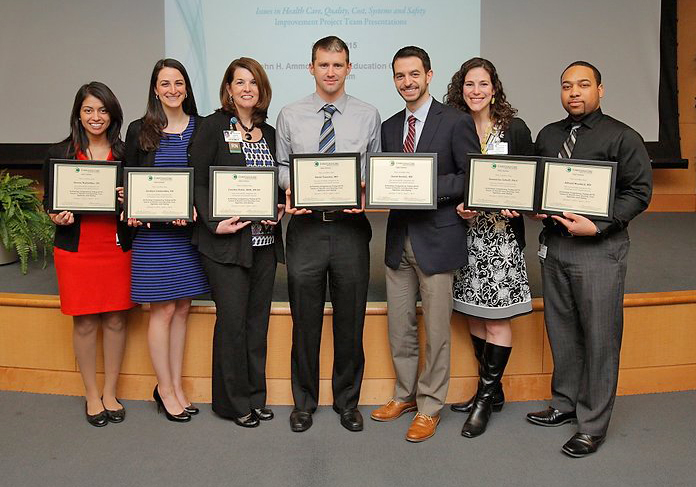
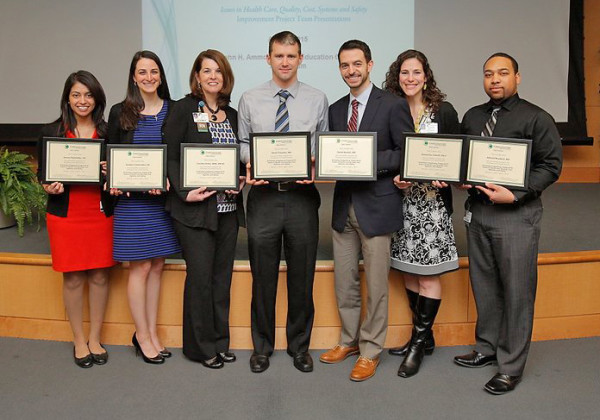
Project team: Seema Niphadkar, D.O., Internal Medicine PGY-3, Jaclyn Limberakis, D.O., MS, Family Medicine PGY-2, Cynthia Noble, MSN, RN-BC, Center for Advanced Joint Replacement, David Yearsley, M.D., Surgery, PGY-3, David Roofeh, M.D., Medicine/Pediatrics PGY-2, Samantha Geboff, PA-C Critical Care, Alfloyd Woodard,
M.D., Internal Medicine, PGY-2.
Leaders and participants in the Achieving Competency Today (ACT) course celebrated the 10th anniversary of the program at the John H. Ammon Medical Education Center on April 1 and praised ACT for making significant contributions to the culture of improvement at Christiana Care.
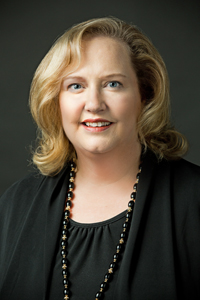
In the 19 ACT courses over the past decade, ACT interprofessional learners have collaborated on 70 performance-improvement projects, “proving that health care really is a team sport,” said Sharon Anderson, MS, BSN, RN, FACHE, senior vice president for Quality, Patient Safety, and Population Health Management.
The ACT course is provided through the Value Institute Academy, which applies a formalized approach to staff education and training in order to facilitate changes in health care delivery that create innovative, effective, affordable systems of care that our neighbors value.
Participants include resident physicians, physician assistants, pharmacists, nurses, social workers, pastoral care and laboratory professionals, and many others.
“ACT is an interdisciplinary approach to experiential learning that teaches the science of improvement and asks participants to immediately use what they’re learning,” Anderson said. “This is key for health care, as we’re called on to reduce patient harm, standardize our approaches to treatment and drive outcomes that are measurable.”
Over the years, ACT has received numerous awards, including a 2010 Innovation Award from the Alliance of Independent Academic Medical Centers, along with numerous Christiana Care Focus on Excellence Awards.
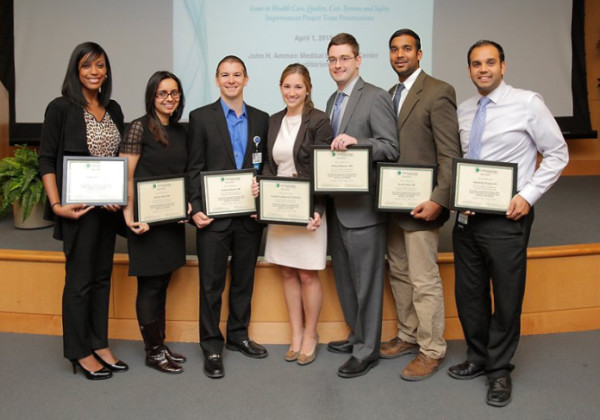
Project Team: Tiffany Eckert, M.D., Family Medicine, PGY-3, Shivani Shah, M.D., Obstetrics-Gynecology, PGY-1, Andrew Vincent, RN, Medical Intensive Care Unit, Jennifer Lukaszewicz, Pharm.D, Clinical Pharmacy Specialist, ID, Jeffrey Wharton, M.D., Internal Medicine, PGY-3, Novneet Sahu, M.D., Emergency Medicine/Family Medicine PGY-3, Kamleish Persad, D.O., Internal Medicine, PGY-2.
ACT teaches a framework for improvement called PDCA: “Plan. Do. Check. Act.” It’s a model that calls on participants to carefully think about an identified problem, review the data, investigate the medical literature, talk with stakeholders, assess root causes, and then design and test an intervention and measure the effect.
“An early project was to have a more helpful search engine on the Christiana Care intranet website, and that idea lives on today with a tool that makes it easier to find all sorts of clinical resources — and there are many such successful projects,” said Carol Kerrigan Moore, MS, FNP-BC, safety and quality education specialist and an ACT facilitator.
There are now close to 500 learners who have completed the program. The Value Institute Academy facilitates change in health care delivery through staff education and training, covering topics such as patient safety, population health, clinical team effectiveness and improvement science.
Cynthia Noble, MSN, RN-BC, of the Center for Advanced Joint Replacement, a recent ACT graduate, was the only nurse on her seven-member team. She quickly realized that the diversity of the teams is a strength of the program.
“It turned out we each brought different strengths. ACT was a very rewarding experience,” Noble said.
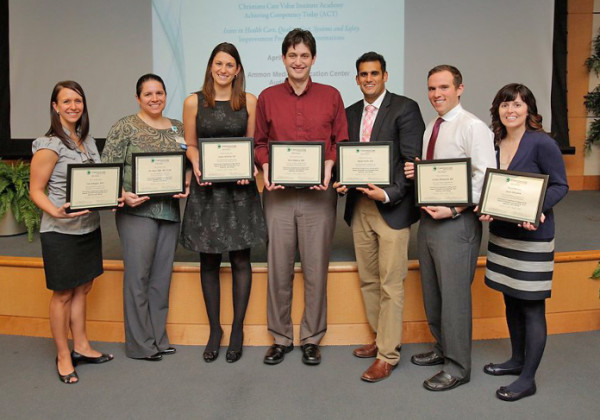
Project Team: Lisa Gahagen, PA-C Critical Care, Jill Kane, BSN, RN, CCRN, Medical Intensive Care Unit, Jamie Gellock, D.O., MPH, Family Medicine, PGY-3, Eric Halpern, M.D., Internal Medicine, PGY-2, Akash Sethi, D.O., Internal Medicine, PGY-3, Jordan Klebanoff, M.D., Obstetrics-Gynecology, PGY-1, Dawn Rhoades, clerk/registrar, Emergency Department.
Evaluations by participants show that learners not only are satisfied with the course, but also experience a significant increase in confidence and skills, which they take back to their individual departments. A six-month post-course follow-up demonstrates strong retention of those skills.
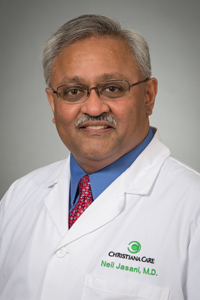
“I can’t think of any other program that matches ACT in terms of the ability of folks from all parts of the health system to interact and develop projects centered on quality and safety,” said Neil Jasani, M.D., MBA, FACEP, chief academic officer and vice president of Medical Affairs.
At the graduation, Anderson and Brian W. Little, M.D., Ph.D., retired vice president of Academic Affairs, were praised for pursuing funding to launch the program. Originally, ACT was a four-week program funded with a grant from the Robert Wood Johnson Foundation, with a curriculum developed by Harvard University’s Partnerships for Quality Education.
Since then, the program has been extended to 12 weeks and is now funded internally.
Among those who find ACT valuable is Lisa Maxwell, M.D., director of the Family Medicine Program, co-director of the Emergency Medicine/Family Medicine Residency Program and director of pre-doctoral education.
“I know for a fact that participation in this course has given residents a competitive advantage as new graduates,” said Dr. Maxwell. “I believe they are better physicians because of this training, and I will continue to require it for as long as the ACT leadership will provide that opportunity.”
This session’s ACT team projects looked at:
- Improving the Rapid Response Team paging system with a redesigned paging form that offers more complete and helpful information.
- Finding ways to rethink the ordering of electrocardiograms so those that are not needed immediately are not ordered as STAT EKGs.
- Developing potential improvements in communications to cardiology consultants by providing clear clinical questions, a standard format and a better ability to reach the teaching team member who placed the consult.
After the teams presented summations of their projects at the graduation, Timothy J. Gardner, M.D., medical director of the Center for Heart & Vascular Health and executive director of the Value Institute, congratulated participants on their work. “I am impressed with how well you’ve analyzed your challenges and the thoughtful improvements you’ve created,” he said.